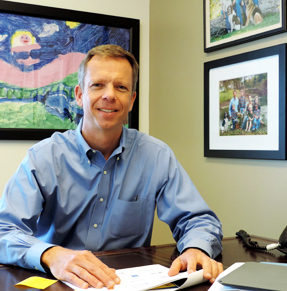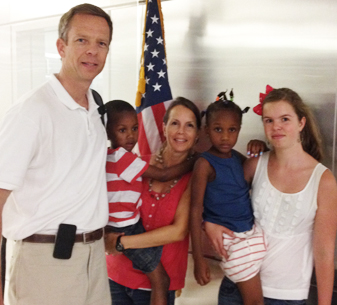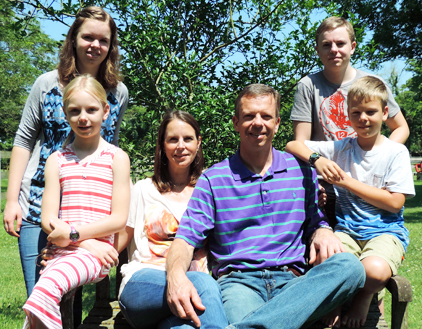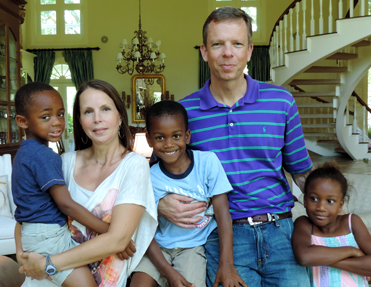© 2015 The Texas Lawbook.
By Patricia Baldwin
(HOUSTON) Sept. 8 – Cliff Vrielink has represented some of the world’s leading energy companies – Royal Dutch Shell, Natural Gas Partners, Dynegy and Spectra Energy, to name a few – in highly complex cross-border transactions valued in the billions of dollars.
The Houston corporate lawyer helped one of the world’s largest oil companies sell its downstream assets in Colombia, Uruguay and Paraguay to Petroleo Brasileiro in a deal worth hundreds of millions of dollars. He advised BP Alternative Energy in a South Dakota project that will create one of the world’s largest wind farms. And he helped Mumbai-based Reliance Industries in a $1.7 billion joint venture with Atlas Energy involving gas interests in the Marcellus Shale in 2010.

For four years, Vrielink and his wife, Ayse, tried to adopt two children from Haiti. A legal process that should have taken weeks or months became years. The couple spent tens-of-thousands of dollars. They took nearly a dozen trips to Haiti. They hired lawyers in Haiti and sought help from U.S. officials in New York.
Nothing they did helped or mattered.
“I’ve done multi-billion-dollar global mergers and acquisitions involving multiple corporations and assets in multiple countries that were simpler than the adoption process we faced,” said Vrielink, a 20-year veteran of international M&A law.
“I have never been more frustrated as a lawyer,” he says.
The story of Cliff and Ayse Vrielink’s efforts to adopt two adorable children from Haiti demonstrates how even the most educated, wealthy, influential and well-meaning families can become exasperated when facing an antiquated international adoption system.
The Vrielinks’ emotions whipsawed from excitement and anticipation to fear and frustration that their dreams and efforts would never be fulfilled. Through it all, they say their faith provided them hope.
“Our story cannot be told without God,” said Ayse Vrielink. “We are led by Him.”

The couple’s journey started in April 2011 when a friend, who is an engineer at Schlumberger Ltd. in Houston, invited Vrielink to join him in a trip to Haiti to help with the earthquake recovery efforts.
Vrielink saw the Haitian children in despair and called home.
Two years earlier, the couple domestically adopted Jeremiah, now 6, at birth. They knew they didn’t want him to be the only face of color in family photos that included their four other children, ages nine to 15.
After one of Vrielink’s first calls from Haiti, Ayse knew that another adoption was possible.
“I know his wonderful heart,” Ayse Vrielink said.
Within days of returning to Houston, Vrielink put the wheels into motion. He initially told his wife that the process would take nine to 12 months.
“I studied the adoption process and law in Haiti, and on paper, it seemed simple,” he said. “We met all the criteria.”
The Vrielinks traveled to Haiti together or separately about a dozen times. Early in the process, they met the two children they hoped to adopt. Bethiana was three. Ashley was two. The bond the couple felt with the children was immediate.
They also met the children’s birth parents, who were amazed that their children would be educated along with the Vrielinks’ natural children.
“The children’s birth parents wanted it to happen. We wanted it to happen,” Vrielink said. “We were passionate about it and thought the process would move quickly. We were nothing but excited.”
That excitement slowly shifted to frustration as the couple discovered that an international adoption process had little in common with a domestic adoption.
In Haiti, the process mostly depends on hand-written records, a system some “50 years behind,” Vrielink said. The lack of computerization complicates matters in Port-au-Prince. He added that he has heard “ridiculous” stories about the paperwork challenges in rural areas.
At one point, the Vrielinks were waiting for the president of Haiti to sign their application. The high-level approval was required because of the Haitian fear that children will become domestic slaves or “restaveks.”
Vrielink explained that, even in modern Haiti, many families who live in poverty give a child to more affluent families — hoping the child will be fed and educated. However, these children often become slaves who work in the homes of their “masters.”

Unlike others, the Vrielinks had connections and influence. But a plea for help from a friend at the United Nations received a reply that Haiti “believes adoption is the last resort.”
As the weeks and months of waiting turned into years, Vrielink continued to lead complex corporate mergers and acquisitions.
In 2012, Vrielink left his long-time law firm, Texas powerhouse Vinson & Elkins, to start the Houston office of Sidley Austin from scratch and help it grow to the 40 lawyers the national law firm has in Houston today.
In 2013, he represented Denham Capital Management in an acquisition of a Colombian energy company worth hundreds of millions of dollars. The deal spanned the legal systems of Canada, Colombia and a few places in between.
“The deal had all sorts of puzzle pieces,” said Vrielink, who found that navigating the various jurisdictions required creativity, but also was a “lot of fun.”
Vrielink found a tremendous amount of support from several of his clients, including Paul Winters, who is the managing director, general counsel and chief compliance officer for Denham Capital.
Winters, who is on the board of Boston-based adoption agency Wide Horizons for Children, said the Vrielinks efforts are a perfect example that billion-dollar international business transactions have fewer complications than an international adoption.
“Sadly, that is the case,” said Winters, who has adopted two children from Ethiopia. “Most business transactions involve like-minded people trying to accomplish a goal, and it is up to them to succeed or fail. International adoption has two willing parties – the prospective family and the child – but, unfortunately, also a vast set of intermediaries in between, and their interests often are not putting children in permanent families.

“Cliff and his wife’s devotion to family is evident from what they’ve done on the adoption front,” he said. “I am amazed he can keep up with his law practice – he is always responsive – and raise seven kids, yet always be calm and collected.”
In between billion-dollar transactions, Vrielink doggedly pursued the adoption in Haiti. Every few months, he would fly to Port-au-Prince to check on the process in person. He made countless phone calls and sent scores of emails. He even hired a Haitian lawyer, but it did little to help.
“The process is frustrating,” Vrielink said. “Adoptive families don’t know where they are [in the process].”
For example, the Vrielinks once got the “good news” that their file had been found. They never knew it had been lost.
“Our file had fallen out the back of a file drawer and no one even noticed for many months,” he said.
The other irony, he explained, is that two million people want to adopt, but often are defeated by the time or money required to complete the process.
“Every child deserves a family,” he added.
The Vrielinks said that friends who adopted two Haitian children provided tremendous support as the process dragged on. They have another friend who has been waiting five years for the adoption of a daughter to be completed.
“We get together,” Ayse Vrielink said. “It’s important to have a community of people to talk to.”
The couple’s perseverance finally paid off in July 2014 when the final aspects of the adoption were completed and the Haitian government allowed Bethiana, who is now 7, and Ashley, who is 6, to come to Houston for the first time.
The Vrielinks said they were prepared for the big issues, but were caught off guard by what they call the “small adjustments” and the “intangibles” in daily life.
For example, Bethiana and Ashley had lived in the Haitian orphanage since infancy. They had never encountered grass or pets. They didn’t know colors or shapes. They were afraid of police. Now, they love animals and are progressing in school. And Ashley wants to be a policeman.
“The hardest thing to understand is the void. It’s overwhelming. There’s so much to make up for,” Ayse Vrielink said, adding, “We focused on how they would adjust. We didn’t focus on how we would adjust.”
She laughed and acknowledged that there is “lots of life” on the 14-acre family homestead in Richmond that also is home to four dogs, three horses, two cats, two goats and four donkeys.
Despite the time and energy Vrielink committed to the adoption and now spends with his expanded family, clients say it has only made him a better lawyer.
“For someone as busy as he is, he always makes himself available,” said David Finan, director of EIV Capital in Houston. “My bar for my counsel is pretty high. There are a lot of good lawyers. Cliff is a real person. He provides real counsel.”
Finan credited Vrielink’s penchant for finding solutions partly to his fatherhood of seven.
“Cliff is one of the few lawyers who knows how not to become an impediment,” Finan added with a laugh. “That’s why he’s so successful in building his practice.”
Vrielink said that in order to be a successful father and service provider, he is simply honest with clients. He also said he is good at compartmentalization. Whether he is at work or at home, he said he tries to focus.
Now, as Vrielink participates in the growth of Sidley’s Houston office, the firm’s energy practice and his family, he said he knows success lies in motivation beyond money.
“It’s something more important,” he said on a recent “casual Friday” on Sidley’s 60th floor of the Wells Fargo Plaza in downtown Houston.
Casual Friday at Sidley in Houston also means a buffet lunch on the 61st floor, where conversations hint of the corporate culture as well as the camaraderie among lawyers and staff.
One associate, recently returned from paternity leave, traded parenting stories with Vrielink. There was talk of another associate working remotely from Italy, where her family traveled for an audience with the Pope.
Sidley co-managing partner Jim Rice said the firm is family friendly and was supportive as Vrielink maneuvered through the hurdles of the international adoption process – ongoing at the time he joined Sidley.
“His love for children got him across the goal line,” Rice said, and through the red tape and more … “pink … green … blue …”
Whatever the color of bureaucracy, Cliff Vrielink acknowledged that being a parent is difficult.
Then he added, “This is what God called us to do. It’s wonderful.”
© 2015 The Texas Lawbook. Content of The Texas Lawbook is controlled and protected by specific licensing agreements with our subscribers and under federal copyright laws. Any distribution of this content without the consent of The Texas Lawbook is prohibited.
If you see any inaccuracy in any article in The Texas Lawbook, please contact us. Our goal is content that is 100% true and accurate. Thank you.
